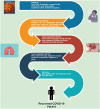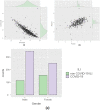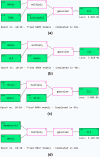Artificial intelligence for diagnosis of mild-moderate COVID-19 using haematological markers
- PMID: 37436038
- PMCID: PMC10339777
- DOI: 10.1080/07853890.2023.2233541
Artificial intelligence for diagnosis of mild-moderate COVID-19 using haematological markers
Abstract
Objective: The persistent spread of SARS-CoV-2 makes diagnosis challenging because COVID-19 symptoms are hard to differentiate from those of other respiratory illnesses. The reverse transcription-polymerase chain reaction test is the current golden standard for diagnosing various respiratory diseases, including COVID-19. However, this standard diagnostic method is prone to erroneous and false negative results (10% -15%). Therefore, finding an alternative technique to validate the RT-PCR test is paramount. Artificial intelligence (AI) and machine learning (ML) applications are extensively used in medical research. Hence, this study focused on developing a decision support system using AI to diagnose mild-moderate COVID-19 from other similar diseases using demographic and clinical markers. Severe COVID-19 cases were not considered in this study since fatality rates have dropped considerably after introducing COVID-19 vaccines.
Methods: A custom stacked ensemble model consisting of various heterogeneous algorithms has been utilized for prediction. Four deep learning algorithms have also been tested and compared, such as one-dimensional convolutional neural networks, long short-term memory networks, deep neural networks and Residual Multi-Layer Perceptron. Five explainers, namely, Shapley Additive Values, Eli5, QLattice, Anchor and Local Interpretable Model-agnostic Explanations, have been utilized to interpret the predictions made by the classifiers.
Results: After using Pearson's correlation and particle swarm optimization feature selection, the final stack obtained a maximum accuracy of 89%. The most important markers which were useful in COVID-19 diagnosis are Eosinophil, Albumin, T. Bilirubin, ALP, ALT, AST, HbA1c and TWBC.
Conclusion: The promising results suggest using this decision support system to diagnose COVID-19 from other similar respiratory illnesses.
Keywords: Artificial intelligence; COVID-19; clinical markers; decision support system; machine learning.
Conflict of interest statement
No potential competing interest was reported by the authors.
Figures















Similar articles
-
A Decision Support System for Diagnosis of COVID-19 from Non-COVID-19 Influenza-like Illness Using Explainable Artificial Intelligence.Bioengineering (Basel). 2023 Mar 31;10(4):439. doi: 10.3390/bioengineering10040439. Bioengineering (Basel). 2023. PMID: 37106626 Free PMC article.
-
COVID-19 diagnosis using clinical markers and multiple explainable artificial intelligence approaches: A case study from Ecuador.SLAS Technol. 2023 Dec;28(6):393-410. doi: 10.1016/j.slast.2023.09.001. Epub 2023 Sep 9. SLAS Technol. 2023. PMID: 37689365
-
Benchmarking of Machine Learning classifiers on plasma proteomic for COVID-19 severity prediction through interpretable artificial intelligence.Artif Intell Med. 2023 Mar;137:102490. doi: 10.1016/j.artmed.2023.102490. Epub 2023 Jan 18. Artif Intell Med. 2023. PMID: 36868685 Free PMC article. Review.
-
Clinical and Laboratory Approach to Diagnose COVID-19 Using Machine Learning.Interdiscip Sci. 2022 Jun;14(2):452-470. doi: 10.1007/s12539-021-00499-4. Epub 2022 Feb 8. Interdiscip Sci. 2022. PMID: 35133633 Free PMC article.
-
Application of Artificial Intelligence to Address Issues Related to the COVID-19 Virus.SLAS Technol. 2021 Apr;26(2):123-126. doi: 10.1177/2472630320983813. Epub 2021 Jan 4. SLAS Technol. 2021. PMID: 33390088 Free PMC article. Review.
Cited by
-
Towards Improved XAI-Based Epidemiological Research into the Next Potential Pandemic.Life (Basel). 2024 Jun 21;14(7):783. doi: 10.3390/life14070783. Life (Basel). 2024. PMID: 39063538 Free PMC article. Review.
-
Multifractal analysis and support vector machine for the classification of coronaviruses and SARS-CoV-2 variants.Sci Rep. 2025 Apr 29;15(1):15041. doi: 10.1038/s41598-025-98366-5. Sci Rep. 2025. PMID: 40301538 Free PMC article.
-
Decision tree-based learning and laboratory data mining: an efficient approach to amebiasis testing.Parasit Vectors. 2025 Jan 29;18(1):33. doi: 10.1186/s13071-024-06618-6. Parasit Vectors. 2025. PMID: 39881359 Free PMC article.
-
Explainable artificial intelligence and machine learning: novel approaches to face infectious diseases challenges.Ann Med. 2023;55(2):2286336. doi: 10.1080/07853890.2023.2286336. Epub 2023 Nov 27. Ann Med. 2023. PMID: 38010090 Free PMC article.
-
Construction and validation of a prognostic model of angiogenesis-related genes in multiple myeloma.BMC Cancer. 2024 Oct 11;24(1):1269. doi: 10.1186/s12885-024-13024-9. BMC Cancer. 2024. PMID: 39394121 Free PMC article.
References
-
- WHO . WHO coronavirus (COVID-19) dashboard; 2023; [cited 2023 Apr 21]. Available from: https://covid19.who.int/
MeSH terms
Substances
LinkOut - more resources
Full Text Sources
Medical
Miscellaneous
